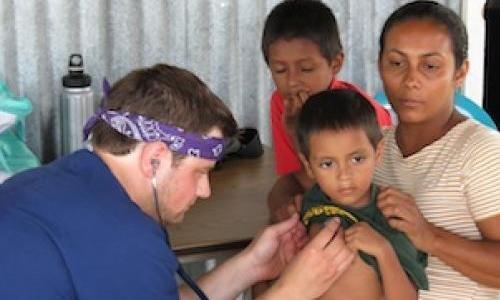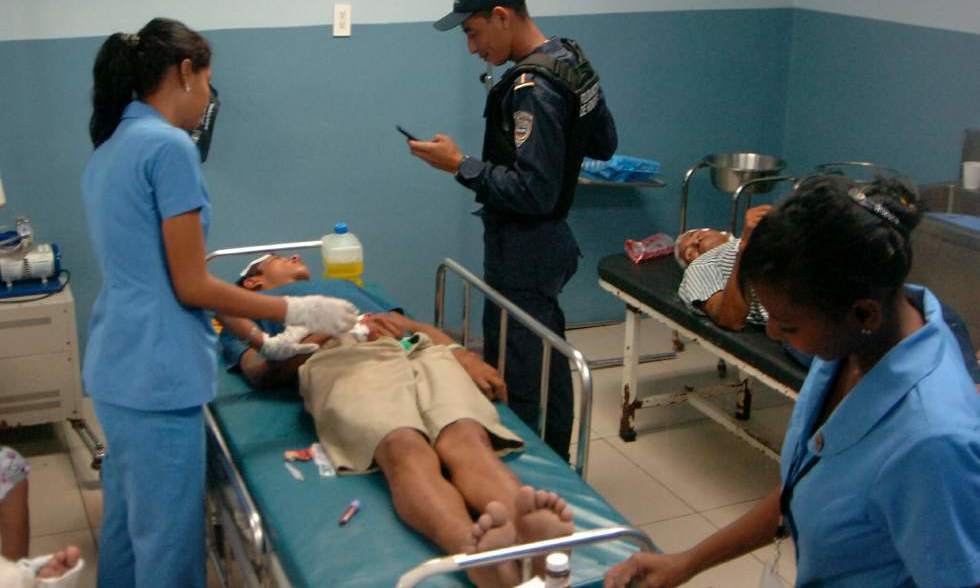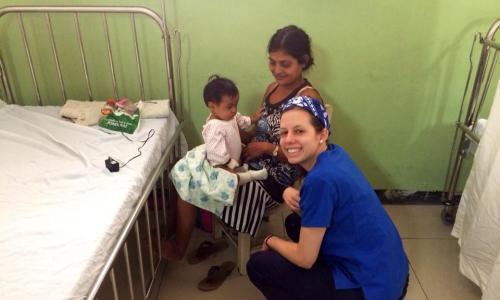Healthcare and Medical Volunteering in Honduras
My Travel Story
My name is Cassandra Davis and I am a current second year nursing student at New York University in the Rory Meyers College of Nursing. I have always been fascinated by healthcare, travel and learning other cultures/languages.
I have volunteered over 350 hours in a local hospital nearby my home in San Diego, CA during the last two years of high school. I was a junior volunteer spending most of my time in the Main Pharmacy. My duties included delivering a wide range of medicines throughout all areas of the hospital. Some of my favorite parts of the hospital to observe were the Emergency Department, Pediatrics, Neonatal Intensive Care Unit, and the Mental Health Center. I have had the opportunity to witness "behind-the-scenes" of hospital care, while valuing our modern medicine. I was able to interact with patients with a wide range of different needs, and see others' perspectives on life. It was this experience that excited me and led me to choose a career in healthcare.
While deciding on a volunteer program to partake in over the summer, I could not help but consider going abroad to an underdeveloped country that has an under-resourced healthcare system compared to that in the United States. I wanted to make sure that wherever I choose to go, my help could really impact others' lives. I have spent hours upon hours researching different locations in the world to go, and though I would absolutely love to get a chance to do a volunteer trip everywhere - and I hope to do so within my lifetime - I decided Latin America would be a good fit for me.
Honduras, in particular, really stood out to me. Honduras is facing political problems and 65% of eight million people are living in poverty, while 36% are living in extreme poverty. The main sources of income are substinence farming, in which farmers' main priority usually is to grow enough food for their families and themselves. Export of agricultural produce typically brings in little to no surplus trade. Electrical parts are made for the US automobile industry. A large section of society is suffering from poor health and malnutrition. In situations like this, the healthcare system fails to deliver services to the impoverished and most vulnerable. It has been reported that of the many Hondurans that go to public hospitals with illness or injuries, majority leave without receving any medical attention. This is largely due to shortages in medicine and trained staff, along with its government corruption.
It pains me to know that children from disadvantaged homes and sufferers of HIV cannot get the healthcare they need. It is simply not fair that I, a 19 year old Hispanic woman, have grown up never needing to worry about healthcare because my mother has insurance for that. I know that others are not as fortunate to have this access or funds, and not only do I feel compelled to offer all my help, I feel as though it is necessary.
I am really looking to immerse myself in the culture, living with a host family to help improve my Spanish, while directly helping locals of the community in a hospital setting. I hope to gain valuable experience for my future career in nursing, while also expanding my knowledge on other ways of life. This would be perfect through Love Volunteers' program in La Ceiba, Honduras. Through the program, I will be spending 6-8 hours in the local hospital during weekdays, and an additional hour a day attending Spanish classes. I am planning on spending two weeks volunteering during the summer. In La Ceiba, I will be able to work in public hospitals to provide free essential medical assistance.
Love Volunteers has a cost breakdown on their website, showing what percent of the program goes towards. It includes three meals a day (Mon-Fri), totalling to 35% of the cost. Transportation to the hospital is 5% of the cost, housing accomodation in a homestay is 20%. 30% goes towards local support, and 10% goes towards a project donation. A program application fee is $249, and the program fee for two weeks totals to $365. I am also required to supply my own medical textbook for note taking, a stethescope, white shoes, gloves, scrubs, and masks. In order to properly interact with staff and patients at the hospital, I must be able to conversate in Spanish, and I can take classes at a licenced Spanish Language School in La Ceiba. The main chunk of cost is for the rountrip airfaire from San Diego, CA to La Ceiba, Honduras, ranging from $700 to $2,000. Local travel expenses will total to approximately 200 USD for two weeks, including meals during weekends and bus transportation when needed.
I am resorting to ask for the generosity of others who have the ability to contribute towards covering the costs of this important volunteer program. Volunteer programs are essential for the broken medical system in Honduras, and I will do all I can to help those suffering from a severe lack of medical care in the area. I believe everyone deserves the medical treatment they need. This is why the overall goal of the program through Love Volunteers is to supply essential medical treatments to vulnerable residents in La Ceiba. This program will allow me to work closely with a supervising physician or nurse who I will shadow and assist on daily rounds. It is also important to me to be able to communicate with locals in Spanish to form bonds and provide as much care and compassion as I can. I have spent some time in Western hospitals, and this once-in-a-lifetime opportunity would further help me gain far more experience than I have yet received.
So I am asking those who have the finances to donate or support towards providing free healthcare to those who need it most, improving health and wellbeing of Honduras' most impoverished people, saving lives and making a real difference to the people of La Ceiba. Whether you can donate $1 or $100, every single dollar truly means the world to me and makes it that much easier to turn this into a reality. So, if you have made it thus far, thank you so much for taking the time to read this. If you cannot donate, I hope that you have gained more of an understanding of the healthcare system in Honduras. If you can donate, please know that I appreciate it more than I can ever express with words. THANK YOU!
More Travel Information
-
Campaign Ended
$ 415 USD
Total Donation Received-
19%
Funded -
$ 2,094 USD
Goal Amount -
0
Days Left
-
-
Cost Calculator
-
Program Fee
$ 365
-
Special Courses/ Language Programs
$ 130
-
Airfare/ International Flights
$ 800
-
Local Travel Expenses
$ 200
-
Medical/ Travel/ Accident Insurance
$ 250
-
Application/ Deposit Fee
$ 249
-
FundMyTravel Site Fee
$ 100
-
-
In Partnership with:
 Love Volunteers
Love Volunteers
-
Funders
-
Anonymous Funded $ 50 USD
Apr 18, 2017 -
Grandma & Grandpa Funded $ 100 USD
Apr 17, 2017 -
Dad Funded $ 25 USD
Apr 17, 2017 -
Uncle Doug and Aunt Susie Funded $ 200 USD
Apr 17, 2017 -
Jess Funded $ 20 USD
Apr 12, 2017 -
Mommy Funded $ 20 USD
Apr 12, 2017
-



